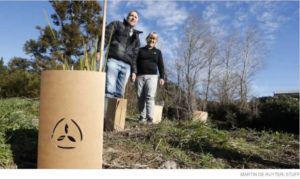By SKARA BOHNY
A teenage environmentalist’s question sowed the seed for an invention to take plastic out of tree planting projects.
Seedlings planted in ecological recovery operations are protected by plant guards, plastic sleeves held in place with bamboo or metal stakes around the plant.
When all goes well, the sleeves can be collected when the plant is established and be re-used.
However, the sleeves are lightweight and often get blown or washed away, especially in wetland or river-bank areas.
To combat the accidental plastic pollution of ecological recovery projects, keen Nelson environmentalists Jan and Robert Fryer of FuturEcology have developed fully biodegradable and recyclable cardboard plant guards.
A teenage environmentalist’s question sowed the seed for an invention to take plastic out of tree planting projects.
Seedlings planted in ecological recovery operations are protected by plant guards, plastic sleeves held in place with bamboo or metal stakes around the plant.
When all goes well, the sleeves can be collected when the plant is established and be re-used.
However, the sleeves are lightweight and often get blown or washed away, especially in wetland or river-bank areas.
To combat the accidental plastic pollution of ecological recovery projects, keen Nelson environmentalists Jan and Robert Fryer of FuturEcology have developed fully biodegradable and recyclable cardboard plant guards.
“The story behind them is our daughter Emma, when she was just 15, she was helping Robert planting a wetland, and she said, ‘dad, why are we putting plastic into the environment?'” Jan Fryer said.
“It was the classic generational shift in environmentalism,” she said.
The Fryers kept working on the idea, and on Wednesday, years after that conversation, launched their product at the Nelson Tasman Business Trust (NTBT).
“People just look at them and say ‘oh, it’s just cardboard’, but it did take a bit of trial and error to get it here,” Fryer said.
Their first attempt was made in the United States, and was a “terrific” product, but the expense and the distance made them a non-viable option.
Eventually, they found the perfect product, made in New Zealand from recycled cardboard pulp. The EmGuard was born.
The EmGuard, named for environment management and in honour of Emma, is made of fully recyclable and biodegradable cardboard coated in a food-safe water resistant coating. The Fryers used them when planting last year, and six months later, despite showing their age, the guards were still fully functional.
“There’s potential to re-use them, if you wanted to go and collect them all up again. But if you just leave them there they break down and become part of the mulch,” Fryer said.
“It makes it easier [for planters], but most importantly: if they blow off or wash off then you don’t end up with more plastic in the environment.”
Fryer said so far councils and a few volunteer environmental groups were their main buyers, but the guards were taking off much faster than they anticipated.
“We were just going slowly, starting up the business side, but there has been so much interest, people keep asking us ‘do you have them, do you have them?’ So we’ve had to go much faster.”
The soft launch at NTBT will be followed by a launch at this year’s Wetland Restoration Symposium in Napier.
Source: Stuff
